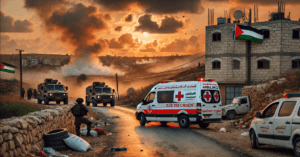Israeli Soldiers Assault Palestinian Medics and Conduct Raids Across West Bank
Israeli soldiers attacked Palestinian Red Crescent medics in Odala, south of Nablus, on Sunday evening. The medics were assaulted while aiding injured Palestinians after Israeli forces entered the village, triggering protests. Soldiers fired live rounds, rubber-coated bullets, and tear gas while also physically attacking medics.
Elsewhere in the West Bank, Israeli forces carried out operations:
- In Al-Isawiya, northeast of Jerusalem, roads were blocked.
- In Al-Khader, near Bethlehem, tear gas and stun grenades were used.
- In Az-Zawiya, west of Salfit, live bullets and stun grenades were reportedly fired.
- In Shuqba, west of Ramallah, soldiers damaged vehicles and fired tear gas canisters.

Israeli Soldiers Assault Palestinian Medics and Conduct Raids Across West Bank
On Sunday evening, Israeli soldiers targeted Palestinian Red Crescent Society (PRCS) medics in Odala, a village south of Nablus in the northern West Bank. The medics were reportedly attacked while providing medical aid to injured Palestinians in the area. The incident occurred after Israeli forces entered the village, sparking protests. In response, soldiers fired live ammunition, rubber-coated steel bullets, and tear gas. They also physically assaulted the medics on duty, despite their role in providing humanitarian assistance.
At the same time, Israeli forces conducted operations in several other areas across the West Bank. In Al-Isawiya, a neighborhood northeast of Jerusalem, soldiers blocked multiple roads, restricting movement. In Al-Khader, a town near Bethlehem, tear gas and stun grenades were deployed in the At-Tall area of the Old City. In Az-Zawiya, west of Salfit, reports indicate that live bullets and stun grenades were fired. Additionally, in Shuqba, a village west of Ramallah, soldiers damaged several vehicles and launched tear gas canisters.
These actions have raised concerns about the treatment of medical personnel and the escalation of violence in the region. The PRCS medics, clearly identified as humanitarian workers, were performing their duties when they were assaulted. Such incidents highlight the challenges faced by medical teams in conflict zones, where their safety is often compromised despite international laws protecting humanitarian workers.
The situation in Odala and other parts of the West Bank underscores the ongoing tensions between Israeli forces and Palestinian communities. The use of live ammunition, rubber-coated bullets, and tear gas against civilians and medics has drawn criticism from human rights organizations. These groups argue that such measures disproportionately affect non-combatants and hinder the delivery of essential medical services.
In Al-Isawiya, roadblocks set up by Israeli soldiers disrupted daily life and restricted residents’ access to essential services. Similarly, in Al-Khader, the use of tear gas and stun grenades in the Old City created a volatile environment, further straining relations between the two sides. In Az-Zawiya, the firing of live bullets and stun grenades contributed to the growing list of violent incidents in the region. Meanwhile, in Shuqba, the destruction of vehicles and the deployment of tear gas further escalated tensions.
The targeting of medics and the widespread use of force during these operations have sparked outrage among Palestinian communities and international observers. Many are calling for an investigation into the conduct of Israeli forces and the implementation of measures to ensure the protection of humanitarian workers. The PRCS has emphasized the importance of respecting the neutrality of medical personnel, who play a critical role in saving lives during conflicts.
Overall, the events in Odala and other parts of the West Bank reflect the broader challenges of the Israeli-Palestinian conflict. The violence against medics and civilians underscores the urgent need for de-escalation and dialogue to address the root causes of these tensions. Without meaningful steps toward peace, such incidents are likely to continue, further endangering the lives of those caught in the crossfire.
You must be logged in to post a comment.